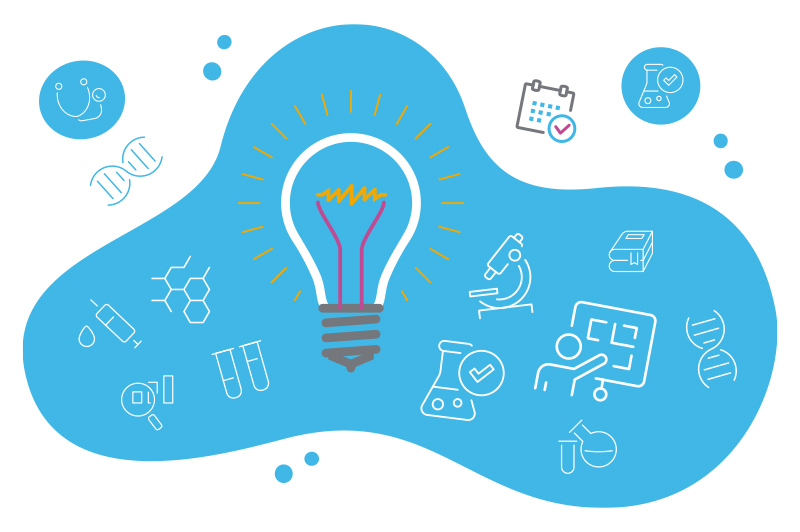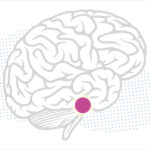Research 2022: Tackling disease in new ways

Researchers across Boston Children’s spent 2022 imagining new solutions to old challenges in health and medicine, opening the door to brand-new treatments. Here are a few areas where research is poised to make a difference in children’s — and even adults’ — lives.
Rethinking disease through genetics
Genetic sequencing is becoming a fundamental tool for discovering and treating conditions early. Finding a genetic variant can help doctors make more nuanced diagnoses and decisions — and sometimes even lead to a personalized, or “precision,” treatment approach.
Genetic findings this year changed how we understand conditions ranging from sudden infant death syndrome to cerebral palsy to heart disease. They changed the way doctors care for newborns born with hypotonia and children with rare conditions like vascular anomalies or unexplained psychosis.
Shining a new light on brain conditions
Our neuroscientists went out of the box, forging new paths to understanding, diagnosing, and treating neurologic conditions. Researchers identified proteins in urine that could help doctors diagnose and track a child’s concussion. They found how changes in diet can reduce seizures, which could lead to more targeted, non-dietary treatments. And some labs turned to genes for answers about the brain, highlighting new avenues for the treatment of everything from hydrocephalus to Alzheimer’s disease.
New angles on cancer
Chemotherapy, the mainstay of cancer treatment, has toxic side effects, and some cancers develop resistance. Researchers across Boston Children’s explored some exciting alternative approaches, including ways to scale up production of CAR-T cells for cancer immunotherapy and genetic fingerprinting for solid tumors, a technique that allows genetic mutations to be matched to targeted treatments. Other studies explored how to prevent “chemo brain,” an unfortunate side effect of chemotherapy on children’s memory, attention, and learning.
Better care for congenital heart disease
2022 brought some helpful insights and tools to improve care for congenital heart disease. These included surgical advances to make heart operations safer, like an improved system for controlling body temperature and tools to locate the vital tissues that control the beating of the heart so surgeons can operate safely around them.
Another study gave insight into predicting which babies with congenital heart disease will need extra support after they’re born to minimize the risk of developmental disorders, using prenatal brain imaging.
Curbing COVID-19
We’re still learning about the effects of infection with SARS-CoV-2, the virus that causes COVID-19. We learned that more than 1 in 4 children and adolescents hospitalized with COVID-19 or MIS-C early in the pandemic still had health problems two to four months later, and that prior infection did not protect unvaccinated children from the Omicron variant. There was also good news: Vaccinating pregnant mothers reduced their babies’ chances of hospitalization with severe COVID-19 by 61 percent.
Work in the lab helped explain why some people with COVID-19 develop life-threatening inflammation and identified a potent family of antibodies that could potentially lead to better vaccines and treatments for COVID-19. Other advances included a rapid home antibody test that could potentially gauge people’s protection against COVID-19 and an airway model of COVID-19, helping researchers test drugs and study how the virus affects our respiratory cells.
Using our own cells to deliver treatments
In the future, with the right cues, our own cells could be used to heal us. Our investigators explored the use of intestinal enteroendocrine cells, which produce about 15 different hormones, to reverse diabetes, obesity, and some gastrointestinal conditions. Another team explored the use of cell therapy to repair or replace damaged lung tissue.
Lessons from big data
The huge volumes of data gathered routinely in medicine — from test results to doctors’ notes — hold insights waiting to be tapped to improve our health. For example, small blood samples from newborns receiving the BCG vaccine yielded clues this year for designing better newborn vaccines in general. Big data, with the help of artificial intelligence, also showed the potential to improve planning for hip surgery and personalize pediatric urology care. Much more to come in 2023!
Explore basic/translational and clinical research at Boston Children’s Hospital.
Related Posts :
-

How a leukemia hijacks the genes needed by blood stem cells
As a child, Lynn Aureli didn’t know that a particular genetic change contributed to her acute myeloid leukemia (AML) — ...
-

Research opens a window into understanding deadly brain tumors
Formerly known as diffuse intrinsic pontine gliomas, diffuse midline gliomas (DMGs) are highly aggressive tumors found in the midline of ...
-

Getting to the heart of heart muscle function
Every heart muscle cell, or cardiomyocyte, is studded with tiny, intricate structures called dyads. The dyads are like orchestra conductors: ...
-

When a critically ill child is homeless
On a single night in 2020, roughly 172,000 in families with children and 34,000 unaccompanied youth under age 25 were homeless, according to government ...





